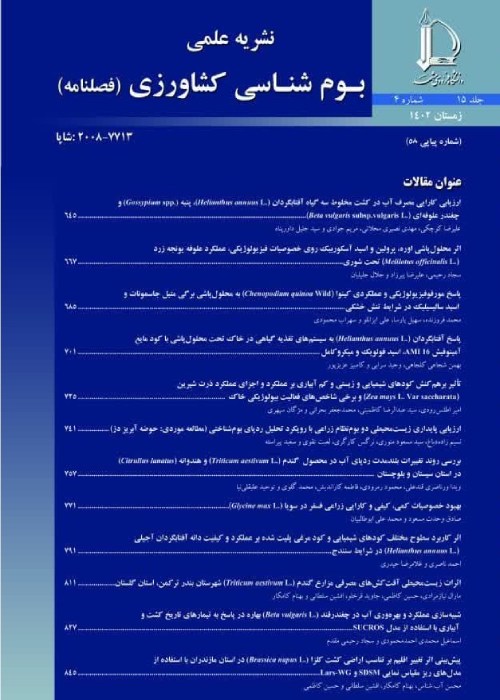Effect of Vermicompost on Morphophysiological, Biochemical and Yield Characteristics of Summer Savory (Satureja hortensis L.) under Different Irrigation Regimes
Summer savory (Satureja hortensis L.) is an annual medicinal herb, belonging to the family of Labiatae. This plant is native to the Mediterranean region and is cultivated extensively in France, Hungary, Spain, and Iran. Drought is one of the most important environmental factors responsible for decreasing global production and performance, especially in areas with low and irregular rainfall. Morphological indices such as plant height, stem length, yield, leaf area, and many of the growth traits of the plant are affected by drought stress.
A factorial layout based on a randomized complete block design with three replications was conducted at the Research Farm at the Mohaghegh Ardabili University, Iran, during 2016-2017. Treatments included three levels of drought stress (Full irrigation (s1), Water cut at 50% of flowering (s2), and Water cut in early stages of flowering (s3) and four vermicompost levels (including 0, 1, 1.5 and 2 t. ha-1). Plants were fully irrigated until eight weeks after seeding, and then drought stress was started at the early stage of flowering and 50 % flowering of plants. Fully irrigated plants throughout the growing season considered as control. The sampling was performed from cultivated plants, by the random collection of 3 individual samples. Samples to evaluate the morphophysiological, biochemical, and yield characteristics were taken at the full flowering stage. Traits such as plant height, dry stem weight, lateral branches, relative water content, electrolyte leakage, chlorophyll fluorescence, chlorophyll a, chlorophyll b, total chlorophyll, carotenoid, proline, protein, Catalase, and peroxidase antioxidant enzymes were measured and assessed. Data were analyzes using SAS V9.2. Mean comparison of results was made using Duncan's multiple range test at P≤0.05 levels.
Morphological traits: The results of the analysis of variance the effects of various vermicompost levels and drought stress and their interaction have been presented. The results showed that the effect of drought stress and vermicompost on plant height and shoot dry weight were significant at the 5% probability level. However, no significant effect was observed on the number of lateral branches. Also, the interaction of drought stress and vermicompost fertilizer treatments was substantial for plant height and dry weight of stem at a 5% probability level.The photosynthetic pigments: The results of the analysis of variance showed that the interaction of drought stress and vermicompost on chlorophyll fluorescence, chlorophyll a, chlorophyll b, and carotenoid was significant at 5% probability level, but the total chlorophyll has a considerable effect. The highest chlorophyll a (23.33 mg.kg-1), chlorophyll b (17.24 mg.g-1) and carotenoid (8.08 mg.g-1) in full irrigation treatment and two tons per hectare of vermicompost and minimum chlorophyll a (17.73 mg.kg-1), chlorophyll b (96.6 mg.g-1) and carotenoid (5.5 mg.g-1) in Water cut in early stages of flowering and Without the application of vermicompost (control).Proline: Based on the results of the analysis of variance, the effect of drought stress and vermicompost on the proline content of Satureja plant was significant at 5% probability level. The results showed that with increasing drought stress, the amount of proline in leaf was raised. However, with the use of vermicompost, leaf proline decreased, with the highest amount of proline (0.226 μg.g-1) in Water cut in early stages of flowering (severe stress) and without application of vermicompost (control) and low proline (0.15 μg.g-1) in Full irrigation (control) and vermicompost treatment (2 t.ha-1) were obtained. Investigating the drought stress on German chamomile plant, researchers reported that drought stress increased proline accumulation in the leaf (Ghaedi Jeshni et al., 2017). It was reported that increasing the amount of drought stress in sorghum increased the amount of proline in the leaf (Esmaeilpour et al., 2013).
Based on the results, it can be concluded that vermicompost 2 t. ha-1 can improve the medicinal plant growth and yield under severe drought irrigation regimes.
- حق عضویت دریافتی صرف حمایت از نشریات عضو و نگهداری، تکمیل و توسعه مگیران میشود.
- پرداخت حق اشتراک و دانلود مقالات اجازه بازنشر آن در سایر رسانههای چاپی و دیجیتال را به کاربر نمیدهد.



